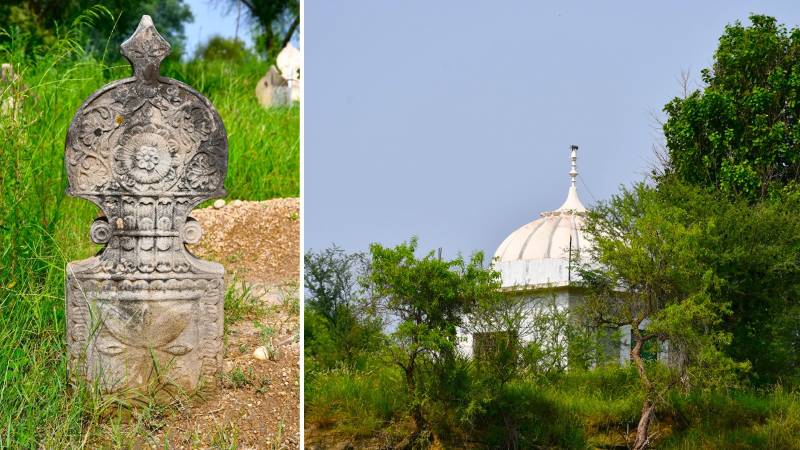
Chwali is a historical village in the Chakwal district, located about 33 km west of Chakwal town. I have visited it several times for my research on the cultural landscape of the village. This village is noted for its historical Jamia mosque, havelis, shrines and da darza (well). Most of the havelis have either disappeared or lost their originality.
The Jamia mosque is the village's most impressive structure, noted for its wooden doors, ceilings and pillars. Such ornately carved doors and pillars are not seen in any other village of Chakwal tehsil. However, one can see wooden carved doors in the mosques of Siral, Ranjha, Fim Kassar and others, but not the fabulously carved pillars. The mosque was built when the village was founded. It was built with financial contributions from the villagers.
Apart from the Jamia mosque, Chwali is also famous for the shrines of Chishti saints, who were mainly from the Qazi family of the Mughal Kassar tribe. According to Qazi Muhammad Farooq of Chwali, who now lives in Rawalpindi, the ancestor of the Qazi family of Chwali was Baba Musa, who was the grandson of Baba Chuwli/Chuli, after whom Chwali is named. There were three brothers from the Kassar tribe: Baba Bhagu, who founded Bhagwal; Baba Karsu, the founder of Karsal; and Baba Chuwli, the founder of Chwali.
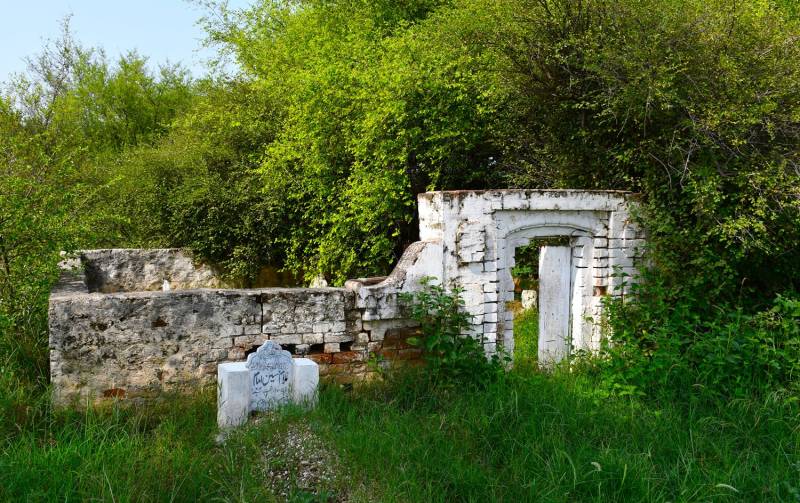
The Qazi family of Chwali produced many eminent scholars, saints and Sufis. The most notable Chishti saint of Chwali was Qazi Ghulam Nabi, who was a deputy of Khwaja Shamsuddin Sialvi, alias Pir Sial (d 1883), who was himself a deputy of Shah Muhammad Suleiman alias Pir Pathan (d 1850). From the Tarikh-e-Mashaikh-e-Chisht by Khaleeq Ahmad Nizami (1953), one gets to know that Shah Muhammad Suleiman Taunsvi had 70 eminent Khulafas (deputies), and his Khalifa Khawja Shamsuddin Sialvi had 35.
Qazi Ghulam Nabi Chishti was born in Chwali village. Haji Muhammad Murid Ahmad Chishti (1997:506) writes in Foz al-Maqal Fi Khulfa- e-Pir Sial that Qazi Ghulam Nabi’s father, Qazi Ghulam Murtaza was a scholar and saint who belonged to Mughal Kassar tribe. He received early religious education from his father and later went to Delhi for further education. He studied under the supervision of eminent Islamic scholar Sadruddin Khan Azurda Dehlavi (d 1868). After completing his education, he returned to his native village, Chwali. Later, upon the request of his student Qazi Abdul Baqi Karsalvi, he started teaching at a madrassah in Karsal village in Chakwal. Qazi Abdul Baqi Karsalvi was a student and disciple of Qazi Ghulam Nabi Chishti. One knows from Foz al-Maqal Fi Khulfa- e-Pir Sial by Haji Muhammad Murid Ahmad Chishti (1997:621) that Qazi Abdul Baqi Karsalvi was initiated into Chishtiyya Silsila by Khwaja Shamsuddin Sialvi. Akhtar Rahi (1998:80), the author of Takira-e-Ulama-e-Punjab Vol.1, writes that Qazi Abdul Baqi Karsalvi was the son of eminent scholar Qazi Ahmaduddin Karsalvi, who was a student of Shah Abdul Aziz Muhaddis Dehlavi (d 1824).
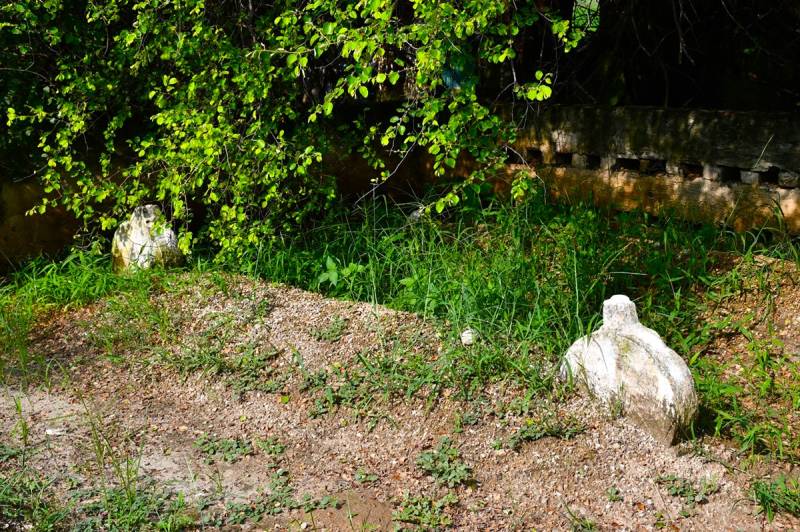
Qazi Ghulam Nabi Chishti also received a robe of initiation (khirqa) from Khwaja Shamsuddin Sialvi, alias Pir Sial. He taught his whole life in Karsal village. After the death of Qazi Abdul Baqi Karsalvi on 25 Ramdhan, 1337/ June 24, 1919, Qazi Ghulam Nabi Chishti continued to teach in a madrassah at Karsal village.
Many scholars studied under his supervision, including Qazi Abdul Baqi Karsalvi, Maulana Muhammad Waliullah, Maulana Muhammad Jaffar Chishti, Maulana Qazi Abdul Rahman, Maulana Noor Ahmad Chishti Mairvi and others. Maulana Muhammad Jaffar Chishti was born in Chwali. He was a mudarris (teacher) who taught in Makhad, Chura Sharif and other places. He settled in Bhikhi Sharif in Mandi Bahauddin district, where he died and was buried there.
Qazi Ghulam Nabi Chishti died on 11 Rabi al-Awwal, 1343/ October 1924 and was buried in Chwali. His mazar (shrine) is located north of Chwali village on the Chwali-Karsal Road. There are three graves inside a walled enclosure of Qazi Ghulam Nabi Chishti. The central grave belongs to Qazi Ghulam Nabi Chishti, which is flanked by the graves of Hafiz Ghulam Rasool and Maulana Zaman. There are several stone-carved graves in the Chwali graveyard. A few graves with exquisitely carved gravestones are also located near the shrine of Qazi Ghulam Nabi Chishti.
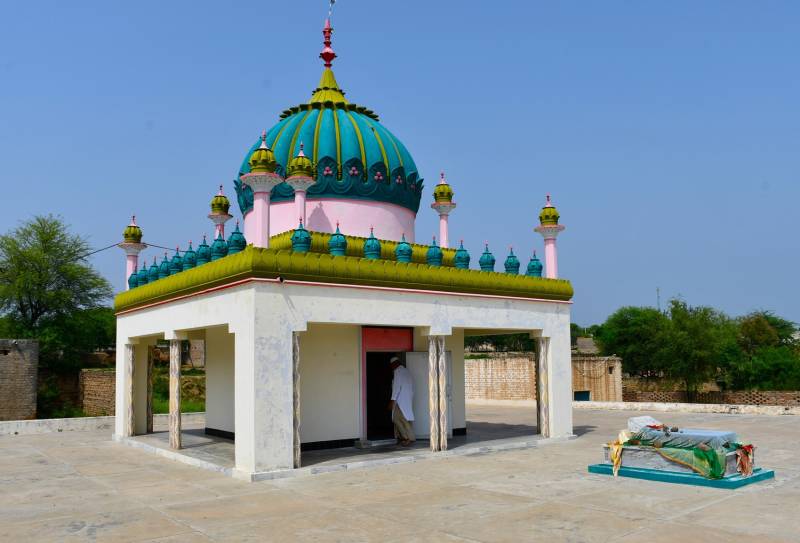
Another famous Chishti saint of Chwali was Khwaja Ahmad Noor, son of Qazi Muhammad Shah, who also studied under the supervision of Qazi Ghulam Nabi Chishti in a madrassah at Karsal village. Later, he became a deputy of Khwaja Ahmad Mairvi, whose shrine is located at Maira Sharif in Attock’s Pindigheb tehsil. According to Faizan-e-Mairvi by Khwaja Muhammad Fakharuddin Mairvi (2006:43), the maternal uncle of Khwaja Ahmad Mairvi was a disciple of Khwaja Shah Muhammad Suleiman Taunsvi who used to visit him at Taunsa Sharif frequently. Once, Khwaja Ahmad Mairvi also accompanied his maternal uncle Ali Khan to the khanqah of Shah Muhammad Suleiman Taunsvi. It is said that Khwaja Shah Suleiman accepted Khwaja Ahmad Mairvi as his Khalifa at the age of 15.
Khwaja Ahmad Noor Chishti Mairvi spent his whole life preaching the thoughts and ideology of his spiritual master, Khwaja Ahmad Mairvi. After getting the robe of initiation from his spiritual mentor, Khwaja Ahmad Mairvi, Khwaja Ahmad Noor Chishti Mairvi returned to his village, where he preached Chishtiyya-Mairviyya Silsila. From Badar-e-Munir by Maulana Muhammad Usman Ghani Chishti Mairvi (1986:45), one learns that Khwaja Ahmad Noor Chishti Mairvi was granted a piece of land by a local landlord of Chwali where he constructed a mosque and started teaching students there. Moreover, Mufti Muhammad Usman Ghani Chishti Rizvi Mairvi further that an eminent scholar, Allama Muhammad Abdul Ghafoor Hazarvi (1909-1970), met Khwaja Ahmad Noor thrice at Chwali village, which reflects how learned scholar Khwaja Ahmad Mairvi was. He died in 1955 and was buried next to the mosque that he built during his lifetime. One of his followers built a domed structure over his grave. His followers also renovated the mosque of Khwaja Ahmad Noor Chishti Mairvi.
Apart from Khwaja Ahmad Noor’s shrine, the shrine of another deputy of Khwaja Ahmad Mairvi, Pir Habib Shah Gilani, is located near Chwali village. It is situated at Mulwal village, 3 km west of Chwali village. Maulana Muhammad Usman Ghani Chishti Rizvi Mairvi (1986:47) discusses in his book Badar-e-Munir that Pir Habib Shah was a resident of Chaki in Pindhigheb Teshil. After getting a robe of initiation (khirqa) from his spiritual master, Khwaja Ahmad Mairvi, he settled on a hill near Chwali, where he spent most of his time in prayers there. He was also entrusted with supervising the langar khana and ensuring water availability at the Darbar of Khwaja Ahmad Mairvi, which he did for several years.
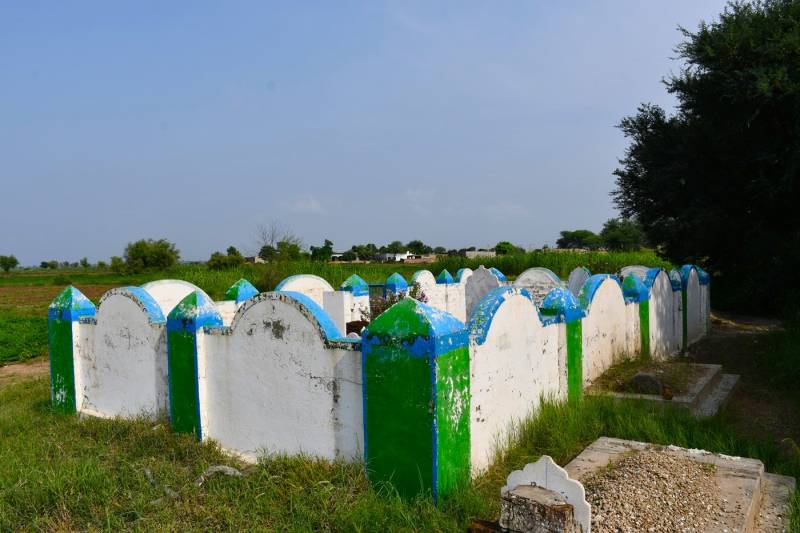
Another learned Sufi saint and scholar of Chwali village was Mufti Muhammad Usman Ghani Chishti Mairvi. He was a learned scholar and author of several books. He continued the legacy of his family's Chishti saints. He also owned a good library. The scholars of Karsal, Qazi Ahmaduddin and his son Qazi Abdul Baqi, also had a good collection of books on theology and other subjects.
According to Anwar-e-Sial by Haji Muhammad Murid Ahmad Chishti (2008:206), Mufti Muhammad Usman Ghani Chishti Mairvi was born in 1913 at Chwali and received his early education from his father, Qazi Mian Muhammad, Mufti Atta Muhammad Rattavi and Maulana Wali Muhammad of Chwali. Later, on the instruction of Mufti Atta Muhammad Rattavi (d 1957), he went for further education in Rampur. He also learned from eminent scholar Maulana Muhammad Naeeumuddin Muradabadi (d 1948). He was initiated into Chishtiyya-Mairviyya Silsila by Huzoor Thani (d 1931), the first successor of Khwaja Ahmad Mairvi (d 1911).
Maulana Muhammad Usman Ghani Chishti Mairvi was the author of nine books. He died in 1998 and was buried in the Chwali graveyard. His shrine is located on the east of the Chawli-Bhagwal Road. He had three sons. The graves of his two sons, Moulvi Maqbool Ghani and Qazi Maqsood Ghani, are located inside the walled enclosure, whereas the grave of his third son, Qazi Masood Ghani, is located outside the wall enclosure. The graves of his father, Qazi Mian Muhammad (d 1967), and uncle, Qazi Ghulam Muhammad (d 1945), are situated northwest of his walled enclosure.
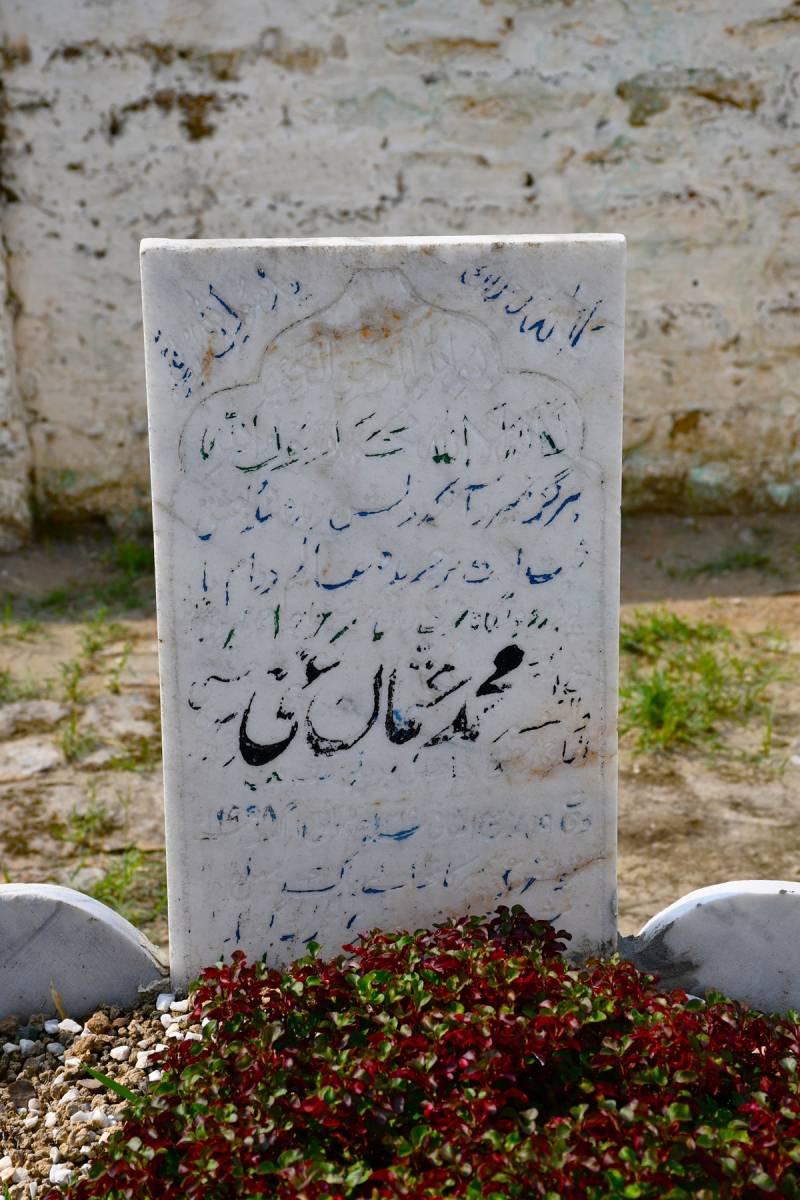
There were two persons named Qazi Ghulam Muhammad. The first Qazi Ghulam Muhammad (d 1945) was a deputy of Khwaja Ghulam Nabi (d 1889) of Lilla Sharif of Jhelum’s Pind Dadan Khan tehsil. According to Tazikra Ulama-e- Ahl-e- Sunnat Zila Chakwal by Allama Hafiz Abdul Haleem Naqshbandi (n.d:67,74), Qazi Ghulam Muhammad was a deputy of Khwaja Ghulam Nabi (d 1889) and taught in many madrassahs including Kot Sarang, Dhoke Virk near Neela, and Munday villages. The second Qazi Ghulam Muhammad, who was the maternal uncle of Abdur Rahman Nambardar, was the first to begin Friday prayers in the Jamia mosque in Chwali village.
Many other members of the Qazi family played a significant role in imparting religious education in various villages in Chakwal and other Punjab districts. The list of Qazi scholars and saints from Chishtiyya and Naqshbandiyya Silsilas is very long. Mufti Qazi Saeed (d 1978), an eminent Islamic scholar of Chwali, the son of Qazi Idrees, was a student of Maulana Shabbir Ahmad Usmani (1887-1949). He was the author of several books. He died in Miani village in Sargodha district and was buried there.
The saints, sufis and scholars of the Qazi family of Chwali preached in Punjab and other regions. Some went out of Chwali to preach and settled there, and others stayed in their villages, carrying the legacy of their spiritual masters.

